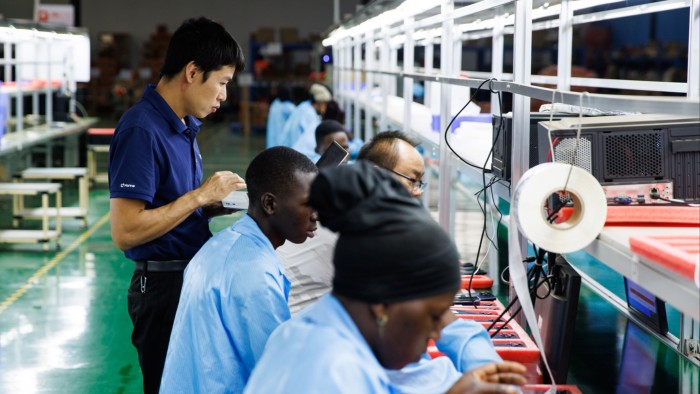Unlock the Editor’s Digest at no cost
Roula Khalaf, Editor of the FT, selects her favorite tales on this weekly e-newsletter.
The worth of Chinese language firms’ new funding and development contracts in nations which might be a part of President Xi Jinping’s world Belt and Street Initiative has hit a document excessive this yr, a brand new research has discovered.
The growth in abroad markets and China’s elevated engagement with nations underneath its flagship BRI infrastructure programme distinction starkly with the method of the US, the place President Donald Trump is imposing bruising tariffs on buying and selling companions all over the world.
Chinese language development contracts and investments in BRI members totalled $124bn over 176 offers within the first six months of the yr, better than the whole of $122bn for the entire of 2024, in response to a research by Australia’s Griffith College and the Inexperienced Finance & Improvement Middle in Beijing.
“The surge in Chinese language engagement this yr is shocking, even in opposition to the backdrop of steadily rising BRI exercise since Covid,” mentioned Christoph Nedopil Wang, the research’s writer. “What units 2025 aside is the dimensions: a number of megadeals every exceeding $10bn.”
Wang mentioned gradual home progress and the necessity to diversify provide chains and markets because of the commerce warfare sparked by Trump’s tariffs had prompted some Chinese language firms to look overseas, whereas BRI nations noticed “a chance to deepen ties with China amid shifting world geoeconomic dynamics”.
Launched in 2013, Xi has used the BRI to deepen China’s financial affect and commerce ties with 150 nations, significantly within the growing world.
The surge within the first half introduced the whole worth of contracts and investments underneath BRI to $1.3tn, the research discovered, comprising contracts price about $775bn in development and $533bn in non-financial investments.
“China’s energy-related engagement in 2025 was the best in any interval for the reason that BRI’s inception,” the research mentioned, including that the worth of such funding and development contracts was highest in Africa at $39bn and Central Asia at $25bn.
The research discovered oil and fuel development contracts and funding surged to a document excessive of about $44bn within the first half, exceeding full-year 2024, with $20bn of labor involving processing amenities in Nigeria.
Kazakhstan acquired probably the most funding of any particular person BRI accomplice at $23bn, whereas Latin America acquired its lowest worth of contracts and investments in 10 years.
Chinese language firms’ contracts and funding in wind, photo voltaic and waste-to-energy tasks in BRI companions hit a document of almost $10bn, whereas in addition they continued to spend money on coal and ploughed a document almost $25bn into metals and mining.
Different researchers additionally mentioned their calculations confirmed a rise in BRI offers.
US-based Rhodium Group mentioned that introduced overseas direct funding by Chinese language entities in BRI nations was price almost $15.9bn within the first quarter, up 10 per cent from the identical interval a yr earlier.
Rhodium mentioned south-east Asia accounted for a lot of the funding momentum in BRI nations as firms sought to diversify their manufacturing bases from China.
The Griffith and GFDC research mentioned south-east Asia attracted the second-highest funding flows after Central Asia, with almost $11.3bn.
Rebecca Ray, senior tutorial researcher at Boston College’s International Improvement Coverage Middle, which additionally tracks the BRI, mentioned the programme had shifted from sovereign lending to FDI because it matured.
IMF knowledge confirmed that China’s web fairness overseas soared by greater than 50 per cent between 2018 and 2023. This in contrast with progress of simply 21 per cent for the US.
“This shift could also be useful, because it avoids contributing to sovereign debt issues,” Ray mentioned.
Lately, China has been accused of luring BRI nations right into a debt trap by lending closely to them to fund mega-infrastructure tasks.
Ray mentioned rising commerce tensions and obstacles between the US and Europe and “world south” nations meant commerce between China and its BRI companions was set to extend.
She mentioned China had eradicated tariffs for African nations whilst a lot of them confronted future carbon pricing-related duties on their exports to Europe and new tariffs on their exports to the US.
“Commerce flows will little question alter to satisfy this new actuality, and funding patterns will observe,” Ray mentioned.

